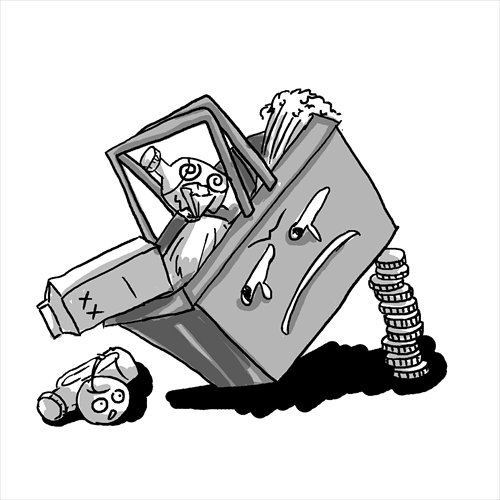Japanese economy could pay high price for tax hike

Illustration: Lu Ting/GT
The beginning of April saw Japan raise its sales tax for the first time in 17 years in an effort to rein in the country's huge public debt.
Although Prime Minister Shinzo Abe already announced stimulus measures to soften the impact of the tax increase, observers and experts remain split on whether the hike will choke off Japan's fragile economic recovery. Nevertheless, it should be pointed out that even if the economy survives the current increase, an 8 percent sales tax is still far from enough to deal with the country's dizzying fiscal debt.
Raising sales tax has long been a political taboo in Japan, where the last hike in 1997 plunged the country into a recession as consumer spending collapsed. After the tax was increased from 3 percent to 5 percent, Japan's GDP growth rate fell from 1.6 percent in 1997 to minus 2 percent in 1998.
Many now fear that history could repeat itself, as the latest hike is expected to increase the Japanese tax burden by about 5 trillion yen ($49 billion) in the 2014 fiscal year and then around 8 trillion yen annually after fiscal 2015. As private consumption accounts for 59 percent of the country's GDP, any fluctuation in spending will naturally leave a deep impression on the economy. The hike to 8 percent this time is thus expected to remove 6 trillion yen from the economy, equivalent to 1.2 percent of GDP, according to a Reuters' report quoting Robert Feldman, head of economic research at Morgan Stanley in Tokyo. Consequently, all major economic goals set by the Abe administration will likely go unachieved.
However, the tax increase might have been a step the Japanese government had to make in order to avert a possible fiscal debt implosion triggered by skyrocketing social security costs. As Abe told key Cabinet ministers on October 1 last year, he made the decision to "hand over sustainable social security systems to the next generation," The Japan Times reported. The country currently has high debt-to-GDP ratio, around 240 percent, with its national debt exceeding the equivalent of $10 trillion. The country's low birth rate combined with its growing population of senior citizens means that Japan's social welfare costs continue to snowball, adding to the government's mountain of debt. At the end of last year, the Cabinet approved a record 95.88 trillion yen budget plan for the 2014 fiscal year, of which more than 30 trillion yen was allocated for social security spending.
In order to soothe anxieties about potential economic pains, the Abe administration unveiled a 5.5 trillion yen stimulus package late last year. Yet, the move also raises questions regarding whether the plan is sufficient to cushion the immediate tax blow. Many wonder as well whether the tax increase will really offer any help considering that much of the additional 8 trillion yen in tax revenue will just be pumped back into the economy to mitigate its negative impact.
The country's economy would have a much better chance of staying afloat if the Japanese people could see their real incomes grow along with the tax increase. According to estimates from the Bank of Japan, the 3 percentage point tax increase will probably push up the prices of goods by 2 percent. This would come on top of the inflation target of 2 percent the central bank wants to reach over the coming years, meaning incomes need to go up by at least 4 percent in order to maintain current income levels and spending power. Nevertheless, while Toyota, Honda, Toshiba and other large-scale Japanese employers have agreed to raise their base salaries for Japanese workers upon request from the government, the increases have been relatively modest: only about 1 percent or so. In this sense, household purchasing power will likely be compromised in the future.
Fundamentally speaking, Japan's 8 percent sales tax will only increase government revenue by 8 trillion yen annually, a sum which is far too small to mitigate the country's heavy debt burden. According to the Abe administration, the government could institute a second sales tax increase of 2 percentage points in October 2015 after reviewing the impact of the latest hike on the economy. There's still plenty of room to raise sales tax again in Japan, especially when one considers that most developed countries have sales tax rates of about 20 percent. The April hike could be just the beginning, which doesn't bode well for Japan's economic recovery.
The author is a reporter with the Global Times. bizopinion@globaltimes.com.cn